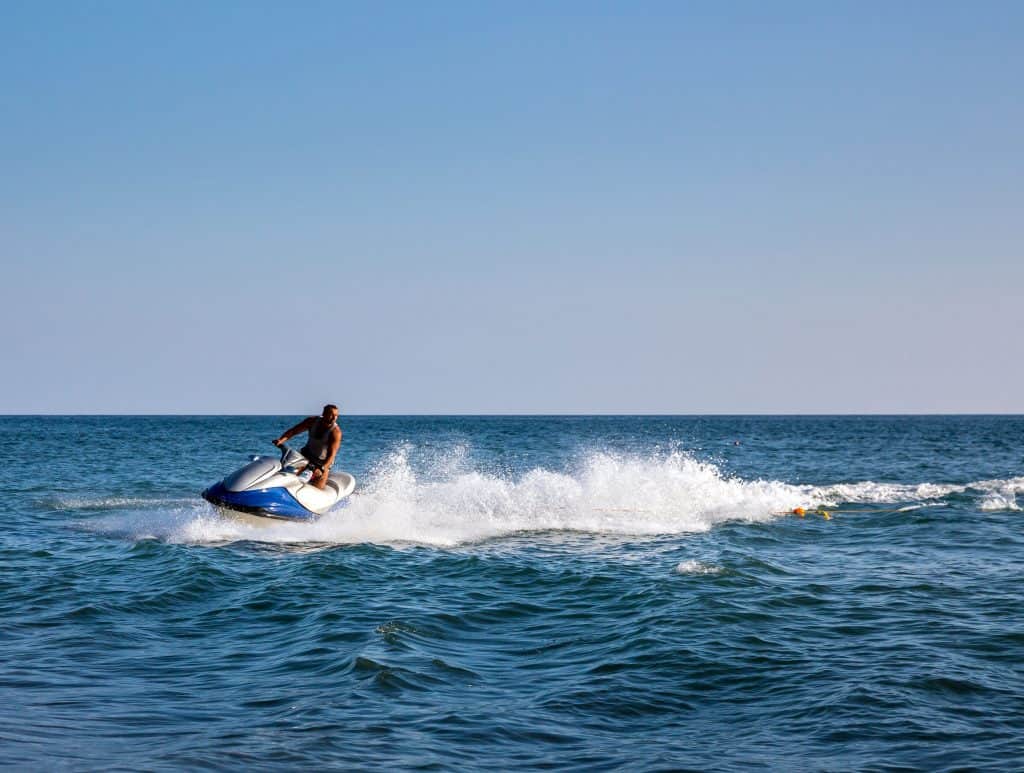
South Carolina has different laws regarding the operation of a jet ski than other states. I know that it can be confusing to know who can and who cannot operate in South Carolina, so below I have the answers for your PWC questions.
A person who is younger than 16 years old will need to pass a boating safety education course. If you are 16 or older you may operate a PWC without any restrictions.
Although you are not legally required to have a boater safety education card once you are older than 16, becoming certified can save you money on boat insurance.
Steps to Becoming an Operator
With our advanced technology today, it is a simple process to take to receive your North Carolina’s boater safety education card.
- If you are under 16 years old you will need to enroll in a South Carolina boating safety course. There are two options you can choose from to complete the course: online or in the classroom. To find a classroom course in your area, go to dnr.sc.gov/education/boated. The most popular online course can be found at boat-ed.com/southcarolina.
- Study the South Carolina boating safety manual and go through the course. Once you finish the course, take the final exam (75 questions) and pass by getting 80 percent or higher.
- Once you print out your temporary card, you are ready to hit the water! Don’t forget to check your mail the next two to three weeks once you pass the test to get your permanent boater safety card.
One nice thing about getting a boater safety education card is that you never have to renew it like a drivers license. It is valid for life and is worth getting.
Understanding South Carolina’s Boating Rules
- There is a requirement of navigation lights that must be on your vessel between sunset and sunrise and during periods of restricted visibility. Some of the most common navigation lights include:
- sidelights (a red light on the left side and a green on the right side that are visible to another vessel coming from the side or head-on)
- Another is called stern light (white light on the back end of the vessel)
- One other navigation light is called a masthead light (this is a light that is required on power-driven vessels and shines a white light forward and to the sides of the vessel)
- The last kind of navigation light is called an all-round white light (this can be used to combine a masthead and stern light into a single white light that can be seen from all angles)
- Most PWCs do not have brakes, so you need to allow lots of room when stopping or slowing down
- The jet ski operator needs to have a lanyard that is attached to the safety switch attached to their wrist at all times
- If your jet ski flips over in the water it is important to remember that if you roll it over the wrong way, you could damage it. There should be a sticker on the back of your jet ski that directs which direction to roll it upright. If you do not have a sticker then look in your owner’s manual for the correct direction
- All persons on board must have a fitted and US coast guard approved life jacket. Make sure to have extra life jackets on board in case more guests arrive
- All vessels must have a Type B fire extinguisher onboard in case of a fire
- There needs to be a US coast guard approved backfire flame arrestor on every vessel that is fueled with gasoline
- A sound-producing device like a whistle, horn, bell, etc. must be on board at all times in case of an emergency
- There can be no negligent, reckless, or illegal operation. Some examples of reckless operation include:
- Weaving your PWC through congested traffic
- Crossing the path of another watercraft unnecessarily close to the other boat or when visibility is restricted
- Swerving at last minute to avoid a collision
- Towing a person behind the watercraft in such a way that causes the towed person to collide with another person or object or to pass through a swimming area
- Allowing passengers to ride on a spot on the watercraft where there may be a chance of falling overboard
- Chasing, disturbing, or harassing wildlife
- Not keeping the speed limits
- There are a number of speed regulations listed below that are required when operating a PWC:
- No operating a PWC with speed in excess of “idle speed” within 50 feet of an anchored boat, a pier or dock, or a person in the water
- You must maintain “idle speed” when you see a flashing blue light from the law enforcement’s watercraft
Regulation Enforcement in South Carolina

After getting the card, the most important thing you can do is keep it on board with you when you are operating. Law enforcement has the right to check your card so always have it available when on board.
Another thing that is discussed in South Carolina’s boating safety manual is a float plan. Before you go out on the water it is a good idea to leave a float plan with someone you trust.
A float plan should describe your vessel including the registration number, length, horsepower, and the type of engine. Explain where you are going, when you plan to leave and when you plan to return. Make sure to include the names, addresses, and phone numbers of every person on board. This is a safety precaution to take just in case there is an accident on the water and you need someone to be aware of you and your vessel.
Boater Safety Certification Requirements for Residents of other States
If you have completed an official boating safety education course in a state other than South Carolina, you can still operate a watercraft in South Carolina as long as you have your card on you.
Your boaters safety education card will last a lifetime and you may use it in other states, however certain states require you to review some of their criteria so make sure you look up the state’s boating laws ahead of time.
South Carolina PWC Rental Regulations
Even though you can operate a PWC at 16 years old in South Carolina, you cannot rent one in South Carolina unless you are 18 years or older. You must also have valid photo identification on you in order to rent out a jet ski.
